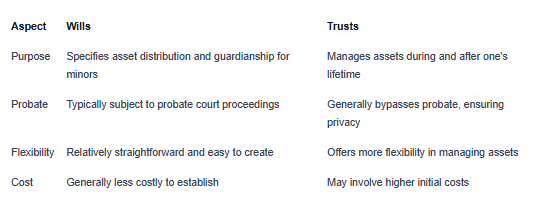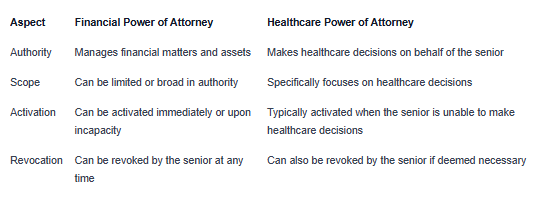The Importance Of Estate Planning For Senior Citizens
March 5, 2025
Uncover the vital role of estate planning for senior citizens. Ensure asset distribution and healthcare needs with expert guidance.


Understanding Estate Planning for Senior Citizens
Estate planning plays a vital role in the financial and personal well-being of senior citizens. Recognizing the importance of estate planning and understanding what it entails are crucial steps for ensuring a secure future.

Importance of Estate Planning
Estate planning is essential for senior citizens to strategically manage their assets, healthcare preferences, and inheritance decisions. By creating a comprehensive estate plan, individuals can:
- Securely transfer their assets to designated beneficiaries.
- Establish contingencies for unexpected events such as disability or incapacitation.
- Minimize tax implications on their estate for the benefit of their heirs.
- Ensure their healthcare wishes are known and respected in case of incapacity.
- Provide a sense of financial security and peace of mind for themselves and their loved ones.
What is Estate Planning?
Estate planning encompasses the process of outlining how an individual's assets and properties will be managed, distributed, and cared for during and after their lifetime. This comprehensive approach involves:
- Will and Trusts: Documents that specify asset distribution and guardianship for minors, offering legal clarity on inheritance matters.
- Power of Attorney: Designating a trusted individual to make financial or healthcare decisions in case of incapacity.
- Healthcare Directives: Outlining preferences for medical treatment and end-of-life care, ensuring one's wishes are respected.
Senior citizens benefit greatly from estate planning as it provides a structured framework for addressing financial, legal, and healthcare decisions, ultimately safeguarding their legacy and ensuring their well-being and that of their loved ones.
Components of Estate Planning
In the realm of estate planning for senior citizens, several crucial components play a vital role in organizing and safeguarding one's assets and interests. These components include wills and trusts, power of attorney, and healthcare directives.
Wills and Trusts
Wills and trusts are fundamental legal documents that outline how an individual's assets and properties should be distributed upon their passing. Let's delve into the key aspects of wills and trusts:

Power of Attorney
A power of attorney (POA) is a legal document that designates a trusted individual to make financial or healthcare decisions on behalf of the senior citizen if they become incapacitated. Here are some key points about power of attorney:

Healthcare Directives
Healthcare directives, also known as living wills or advance directives, outline an individual's preferences for medical treatment in case they are unable to communicate their wishes. Let's explore the key aspects of healthcare directives:

Understanding and implementing these components of estate planning is crucial for senior citizens to ensure their assets are protected, their wishes are carried out, and their best interests are safeguarded as they age. By creating wills and trusts, establishing power of attorney, and outlining healthcare directives, seniors can proactively plan for the future and provide peace of mind for themselves and their loved ones.
Benefits of Estate Planning for Senior Citizens
When it comes to estate planning for senior citizens, there are several key benefits that can positively impact their financial security and well-being. Here we explore three essential advantages of estate planning: ensuring asset distribution, minimizing tax liabilities, and providing for healthcare needs.
Ensuring Asset Distribution
One of the primary benefits of estate planning for senior citizens is the ability to ensure the smooth and efficient distribution of their assets upon their passing. By creating a comprehensive estate plan that includes a will or trust, seniors can specify how they want their assets to be divided among their loved ones. This helps prevent disputes among family members and provides clarity on the deceased individual's wishes.
Minimizing Tax Liabilities
Estate planning also plays a crucial role in minimizing tax liabilities for senior citizens and their heirs. Through strategic estate planning techniques such as trusts and gifting strategies, seniors can potentially reduce the amount of estate taxes that their beneficiaries may have to pay. By optimizing their estate plan to take advantage of tax-saving opportunities, seniors can preserve more of their wealth for future generations.
Providing for Healthcare Needs
Another significant benefit of estate planning for senior citizens is the ability to provide for their healthcare needs as they age. By including healthcare directives in their estate plan, seniors can outline their preferences for medical treatment in the event that they become incapacitated. Additionally, appointing a healthcare power of attorney allows trusted individuals to make healthcare decisions on their behalf, ensuring that their medical wishes are respected.
In summary, estate planning offers senior citizens the opportunity to secure their financial legacy, protect their assets from excessive taxation, and ensure that their healthcare needs are met according to their wishes. By proactively engaging in estate planning, seniors can gain peace of mind knowing that their affairs are in order and their loved ones are taken care of in the future.
Avoiding Probate and Ensuring Privacy
In the realm of estate planning for senior citizens, a key aspect is avoiding the probate process and safeguarding privacy through strategic planning. Understanding the probate process and utilizing estate planning techniques can help seniors secure their assets and maintain confidentiality regarding their estate matters.
Probate Process Overview
Probate is the legal process through which a deceased individual's assets are distributed and debts settled under court supervision. This process involves validating the deceased's will, identifying assets, paying off debts, and distributing remaining assets to beneficiaries according to the will or state laws if there is no will in place.
Here is a simplified overview of the probate process:
Probate Process Steps1. Filing a petition in court2. Notification of heirs and creditors3. Inventory and appraisal of assets4. Payment of debts and taxes5. Distribution of remaining assets
While probate serves a necessary function, it can be time-consuming, costly, and subject to public record, potentially compromising the privacy of the deceased and their beneficiaries. By planning ahead and employing estate planning strategies, senior citizens can minimize the impact of probate on their estate.
Maintaining Privacy Through Estate Planning
Estate planning offers seniors the opportunity to maintain privacy and confidentiality regarding their assets and final wishes. By carefully crafting legal documents and utilizing trust structures, seniors can steer clear of the probate process, thereby ensuring that their estate matters remain private and shielded from public scrutiny.
One effective way to maintain privacy is through the establishment of living trusts, which allow assets to pass directly to beneficiaries outside of probate. Trusts operate privately and do not become part of the public record, offering discretion and confidentiality in the distribution of assets.
Additionally, other estate planning tools like beneficiary designations on accounts, joint ownership arrangements, and gifts can help seniors avoid probate and maintain privacy. By working with legal and financial advisors specializing in estate planning, seniors can develop a comprehensive plan that not only protects their assets but also upholds their privacy concerns.
Through proactive estate planning measures, senior citizens can navigate the complexities of the probate process and safeguard their estate matters, ensuring that their final wishes are carried out with respect and confidentiality.
Planning for Long-Term Care and Disability
When it comes to estate planning for senior citizens, addressing long-term care needs and planning for potential disability are critical aspects that should not be overlooked.
Addressing Long-Term Care Needs
As individuals age, the likelihood of requiring long-term care increases. Long-term care encompasses a range of services and support designed to assist individuals with daily activities such as bathing, dressing, and medication management. It is essential for senior citizens to plan ahead for long-term care needs to ensure they have access to necessary services and support.
One key consideration when addressing long-term care needs is evaluating different care options available, such as home care, assisted living facilities, or nursing homes. Understanding the costs associated with long-term care and exploring insurance options, such as long-term care insurance, can help senior citizens prepare financially for potential care expenses.
Planning for Potential Disability
Planning for potential disability is another crucial aspect of estate planning for senior citizens. Disability can significantly impact an individual's ability to make financial and healthcare decisions, highlighting the importance of establishing appropriate safeguards in advance.
One effective way to plan for potential disability is through the creation of legal documents such as a durable power of attorney and advanced healthcare directives. A durable power of attorney designates a trusted individual to make financial decisions on behalf of the senior citizen if they become incapacitated. Advanced healthcare directives outline the individual's preferences for medical treatment and appoint a healthcare proxy to make healthcare decisions when they are unable to do so.
By proactively addressing long-term care needs and planning for potential disability, senior citizens can create a comprehensive estate plan that safeguards their well-being and assets as they age. Consulting with legal and financial advisors can provide valuable guidance in navigating these complex considerations and ensuring that their estate plan reflects their wishes and priorities.
Working with Professionals for Estate Planning
When it comes to estate planning, enlisting the expertise of legal and financial advisors is essential for senior citizens. These professionals play a vital role in guiding individuals through the intricate process of preparing and securing their estate. In this section, we will explore the importance of legal and financial advisors in estate planning and provide tips for finding the right professionals to assist with this critical task.
Importance of Legal and Financial Advisors
- Legal Advisors: Legal advisors, such as estate planning attorneys, specialize in creating legally binding documents that outline how an individual's assets should be distributed upon their passing. These professionals ensure that the estate plan is in compliance with state laws and minimize the risk of disputes or challenges to the will or trust.
- Financial Advisors: Financial advisors offer valuable insights into the financial aspects of estate planning. They help senior citizens make informed decisions regarding investments, retirement accounts, and tax implications of their estate plan. By working closely with financial advisors, individuals can optimize their assets and develop strategies to minimize tax liabilities.
Tips for Finding the Right Estate Planning Professionals
Finding the right legal and financial advisors for estate planning can be a crucial step in ensuring that your wishes are carried out effectively. Here are some tips to help senior citizens identify reputable professionals for their estate planning needs:

By collaborating with knowledgeable legal and financial advisors, senior citizens can navigate the complexities of estate planning with confidence and peace of mind. These professionals play a crucial role in safeguarding assets, minimizing tax burdens, and ensuring that healthcare needs are addressed in the senior years. Following the tips outlined above can help individuals find the right advisors to guide them through the estate planning process effectively.
Sources
https://www.getyellow.in/resources/the-importance-of-estate-planning-for-senior-citizens-in
https://www.rego-law.com/blog/the-importance-of-estate-planning-for-senior-citizens
https://freedomvillage.org/estate-planning-for-seniors



























































.jpeg)











































































































































































































.avif)























































.jpeg)
































































.jpeg)














.jpg)









































.jpeg)









































































.avif)




.avif)

















































.avif)







































































































































































